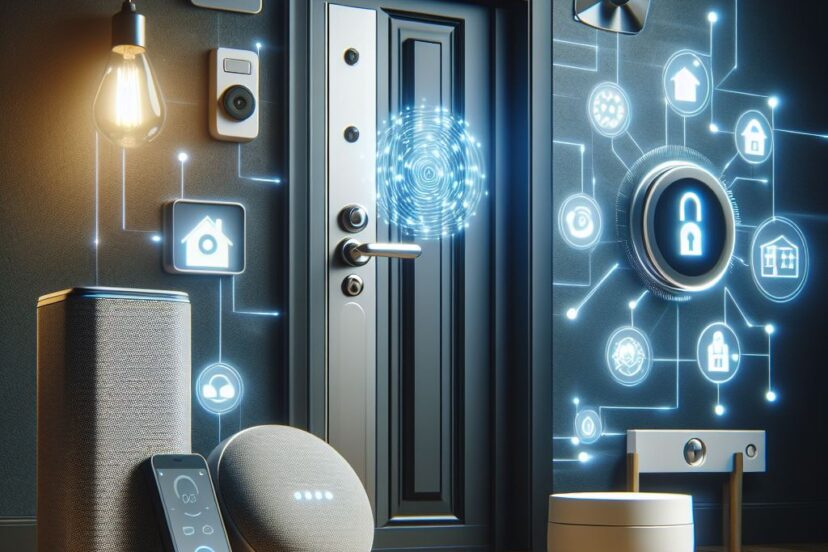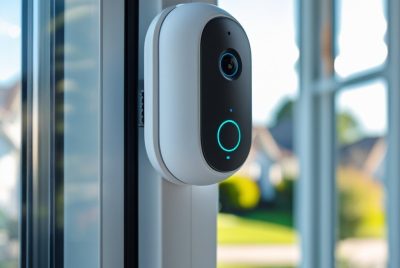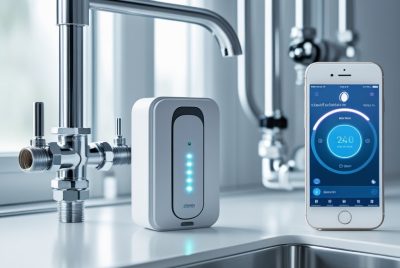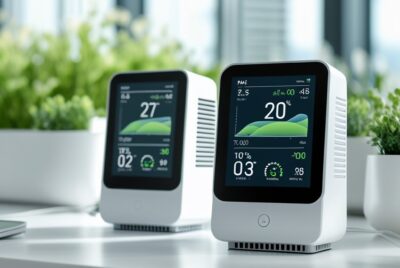Best Smart Locks for Home Security
*We may earn a commission for purchases made using our links. Please see our disclosure to learn more.
Best Smart Locks for Smart Home Security
In today’s rapidly evolving smart home market, the concept of home security has been revolutionized by the advent of smart locks. These sophisticated devices offer both convenience and enhanced security, ensuring that homeowners can control access to their homes with just a few taps on their smartphone or even through voice commands. With their ability to integrate seamlessly into smart home ecosystems, smart locks are a significant step forward from traditional lock-and-key systems.

The selection of the right smart lock for your home can be a daunting task, given the myriad of options available. I pay close attention to features such as remote access, ease of installation, compatibility with other smart home devices, and the level of security provided. Each smart lock offers its own set of unique features tailored to different needs, whether it’s a simple, no-frills locking mechanism or a more complex system with advanced features like biometric authentication or geo-fencing.
As someone who keeps a finger on the pulse of the latest technological developments, I understand that reliability and user-friendliness are as important as the lock’s physical security features. Therefore, when evaluating smart locks for your home, I focus not only on how well they keep the door locked but also on how they improve the overall smart home experience. Integration with home automation, battery life, and the responsiveness of the manufacturer’s customer support are factors that shouldn’t be overlooked in the quest for the best smart lock for your smart home.
Understanding Smart Locks

As an enthusiast for home automation and security, I’ve seen smart locks become indispensable components of modern smart homes. These devices embody innovation by offering not just security but also convenience and connectivity.
Smart locks represent a significant advancement over traditional locks. With features such as remote access, user-specific entry codes, and entry tracking, they provide homeowners with a level of control and monitoring previously unavailable. The integration with other smart home devices means I can manage my lock as part of a wider home automation system.
Connectivity is crucial. Most locks connect via Wi-Fi or Bluetooth, allowing for remote operation. For example, I can unlock my door for a visitor even when I’m not home. Structured integration with smartphones through dedicated apps offers users like me seamless control and real-time alerts on security.
The convenience is unparalleled. Features such as keyless entry, auto-locking, and compatibility with virtual assistants enhance the user experience. Losing keys or worrying about locked doors is a thing of the past, as I can easily check and control the status of my lock from anywhere.
Security remains a cornerstone. Many of the top smart locks boast strong security standards with some providing ANSI Grade 1 certification, the highest level for deadbolt locks. This ensures that users like myself can trust in the physical security of the lock, aside from the technological benefits it confers.
In short, smart locks are more than just locks. They’re integral parts of a connected, secure, and convenient home ecosystem.
Top Picks for Smart Locks

I’ve evaluated the top smart locks on the market to bring you a rundown that prioritizes security, convenience, and integration with smart home systems. Each pick represents a blend of top performance and specific features that could be just what you’re looking for in a smart lock.
August Wi-Fi Smart Lock
My top overall pick is the August Wi-Fi Smart Lock, which stands out for its ease of use and remote access features. The lock conveniently retrofits to your existing deadbolt, meaning you don’t need to replace the keys. It also offers seamless integration with home assistants for voice commands and is known for its robust build quality.
Yale Assure Lock 2
The Yale Assure Lock 2 excels with its touch screen keypad and the option for fingerprint access, rendering it both secure and versatile. It’s a great choice if you’re seeking peace of mind, knowing you have the option of keyless entry without compromising on security. Yale’s reputation for durability ensures this lock is a long-term investment for your home.
Schlage Encode Plus
The Schlage Encode Plus Smart Wi-Fi Deadbolt combines strength with smarts. Here’s a lock that supports Apple HomeKit, allowing for easy use with an Apple Watch, and it comes with built-in Wi-Fi connectivity — no need for extra hubs. It’s also noted for its built-in alarm technology, which can alert you in case of potential security breaches.
Eufy Video Smart Lock
Eufy’s offering, the Eufy Video Smart Lock, merges two crucial home security devices: a smart lock and a video camera. This lock provides live video feed on demand to closely monitor your door. It’s a solid choice for those who yearn for an integrated security system while managing access through their smartphone.
Aqara Smart Lock U100
Lastly, the Aqara Smart Lock U100 is noted for its budget-friendly price point, yet it doesn’t skimp on features. You’ll find multiple unlocking methods, including fingerprint verification, which ensures you’re not sacrificing convenience for cost. It’s a great value pick in the realm of smart locks.
Each smart lock I’ve selected offers a different set of strengths, but all place a high priority on security and smart home compatibility. Whether you prioritize video integration, a budget-friendly option, or a lock that enhances your smart home experience, there’s a smart lock here to suit your needs.
Key Features to Consider

When selecting the best smart locks for your smart home, there are several key features that I consider essential for performance, convenience, and security.
Ease of Access:
- Keypad: Useful for keyless entry, and often backlit for visibility at night.
- Fingerprint Reader: Offers quick and secure access using biometric authentication.
- Remote Access: Allows you to unlock your door from anywhere via smartphone.
- Digital Key / NFC Keycards: Provide alternate entry methods for guests or family.
Connectivity & Integration:
- Bluetooth & Wi-Fi: Essential for connecting your lock to smart home systems like Apple Home and for remote functionalities.
- Built-in Wi-Fi: Eliminates the need for additional hubs.
- App Control: Lets you manage your lock settings and access logs through a smartphone app.
- Smart Home Compatibility: Consider if the lock works with Alexa, Google Assistant, or Apple HomeKit for voice commands.
Security & Management Features:
- Auto-Lock & Auto-Unlock: Ensures your door is always locked; some even use geofencing to lock or unlock as you leave or approach.
- Log: Tracks who enters and when, enhancing security and oversight.
- Voice Control: Allows you to secure your home hands-free.
Physical Attributes & Durability:
- Battery Life: The longer the life, the less often you’ll need to replace the AA batteries.
- Finish Options: Such as matte black or satin nickel, provide aesthetic flexibility to match with your door hardware.
- Deadbolt Replacement vs. Adapters: Some smart locks replace the entire deadbolt, while others adapt your existing one.
By considering these features, I ensure the chosen smart lock not only fits my needs but also complements my smart home ecosystem.
Installation and Compatibility

When I consider smart locks for a smart home, I focus on their ease of installation and their compatibility with different smart home ecosystems. Here’s what I’ve found to be crucial:
Installation: Most smart locks offer DIY installation, which usually requires just a screwdriver. The process typically involves replacing the interior part of the existing deadbolt, which doesn’t take more than 30 minutes. Some locks, like those from August Home, come with a feature called DoorSense, which helps to ensure the door is properly closed and locked.
Smart Home Compatibility:
- Apple HomeKit: For users in the Apple ecosystem, locks that support HomeKit allow for seamless integration with Siri voice commands and automation through the iOS Home app.
- Google Assistant and Google Home: Many locks are compatible with Google’s services, allowing for voice control and integration with other Google Home devices.
- Amazon Alexa: With the right smart lock, I can ask Alexa to control the lock, check its status, or include it in my Amazon-based smart home routines.
- SmartThings: A hub like Samsung’s SmartThings can centralize control of smart devices, including some smart locks.
Wider Compatibility with Matter and Bridges:
- Matter: This upcoming protocol aims to unify smart home devices from different brands, promising broad compatibility and ease of use.
- Hub/Bridge: Some smart locks may require an additional hub or bridge to connect to Wi-Fi or other smart home protocols.
To sum up, I prioritize smart locks that offer easy installation without the need for professional help and ones that play nicely with major smart home platforms and voice assistants.
Security and Access Management

When considering the integration of smart locks into a smart home, I prioritize security and access management. Smart locks enhance security by providing features such as remote locking and alerts for unauthorized access attempts. One of the main advantages is that I can control access remotely, which means issuing virtual keys or access codes to guests without the need for a physical key.
Most smart locks offer a user-friendly interface, typically on a smartphone app, that allows me to generate and revoke access to these virtual keys quickly. This immediacy is crucial in maintaining control over who enters my home. Additionally, smart locks often incorporate pads with keypads or fingerprint locks to verify the user’s identity.
| Feature | Purpose | Example |
|---|---|---|
| Two-factor authentication | Adds an extra security layer | A code sent to my phone in addition to the standard entry code |
| Remote locking/unlocking | Control access from anywhere | Locking my door through a smartphone app even when I’m away |
| Alerts | Notify of security events | Receive notifications when the lock is tampered with or unlocked |
An essential feature for me is two-factor authentication, significantly elevating the security level. If the smart lock detects attempts at physical tampering, tamper alarms can alert me, providing an added layer of security. This integration can prevent burglaries by deterring potential intruders and alerting me to any security breaches.
In a nutshell, smart locks offer a sophisticated approach to security and access management in a smart home. They merge convenience with robust security protocols, ensuring I have peace of mind regarding the safety of my residence.
Frequently Asked Questions
In this section, I’ll address some of the common inquiries regarding smart locks to help you make informed decisions for your smart home.
1. What features should I consider when purchasing a smart lock for my smart home?
I look for smart locks with features like remote access, compatibility with home automation systems, guest access, and activity logs. Durability and battery life are also crucial considerations.
2. How do smart locks integrate with overall smart home security systems?
Smart locks can be integrated through Wi-Fi or Bluetooth technology, allowing seamless connectivity with home security systems. I ensure that the locks are compatible with my other smart home devices for a unified home security ecosystem.
3. What are the advantages of keyless entry systems over traditional locks?
Keyless entry systems offer convenience, allowing me to unlock my door with a smartphone app or a personalized code. This eliminates the possibility of losing keys and the potential security risks associated with physical keys.
4. How do the leading smart lock brands like August, Yale, and Schlage compare in terms of reliability and features?
August locks are known for their easy installation and seamless integration with home automation platforms. Yale locks often combine touchscreens with sturdy hardware, while Schlage locks tend to emphasize high-grade security features and durability.
5. What measures are in place to ensure the cybersecurity of smart locks?
Manufacturers implement features like encryption, two-factor authentication, and automatic updates to combat potential cyber threats. I always check for these measures to ensure the cybersecurity of the smart locks I consider.




